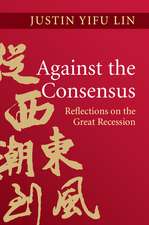Socialist Optimism: An Alternative Political Economy for the Twenty-First Century
Autor Paul Auerbachen Limba Engleză Paperback – 8 mar 2016
The detailed blueprint presented here focuses upon the education and upbringing of children in the context of social equality and household security. It yields a well-defined path to human development and liberation, as well as democratic control of working life and public affairs. Socialism as human development gives a unity and direction to progressive policies that are otherwise seen to be a form of pragmatic tinkering in the context of a pervasive capitalist reality.
| Toate formatele și edițiile | Preț | Express |
|---|---|---|
| Paperback (1) | 647.40 lei 6-8 săpt. | |
| Palgrave Macmillan UK – 8 mar 2016 | 647.40 lei 6-8 săpt. | |
| Hardback (1) | 652.81 lei 6-8 săpt. | |
| Palgrave Macmillan UK – 8 mar 2016 | 652.81 lei 6-8 săpt. |
Preț: 647.40 lei
Preț vechi: 761.65 lei
-15% Nou
Puncte Express: 971
Preț estimativ în valută:
123.88€ • 129.80$ • 102.41£
123.88€ • 129.80$ • 102.41£
Carte tipărită la comandă
Livrare economică 11-25 aprilie
Preluare comenzi: 021 569.72.76
Specificații
ISBN-13: 9781137563958
ISBN-10: 1137563958
Pagini: 522
Ilustrații: X, 522 p.
Dimensiuni: 140 x 216 x 27 mm
Greutate: 0.61 kg
Ediția:1st ed. 2016
Editura: Palgrave Macmillan UK
Colecția Palgrave Macmillan
Locul publicării:London, United Kingdom
ISBN-10: 1137563958
Pagini: 522
Ilustrații: X, 522 p.
Dimensiuni: 140 x 216 x 27 mm
Greutate: 0.61 kg
Ediția:1st ed. 2016
Editura: Palgrave Macmillan UK
Colecția Palgrave Macmillan
Locul publicării:London, United Kingdom
Cuprins
Introduction
PART I: Socialism and Central Planning
Introduction to Part I
1. Planning and Spontaneous Order
2. The Giant Firm and the Plan
3. Technocratic Planning and the Emergence of a Socialist Orthodoxy
4. Socialist Theory and Practice
5. Ironies of History: Markets, Planning and Competition
PART II: Human and Economic Development
Introduction to Part II
6. Education and Economic Growth: The Statistical and Historical Record
7. Education as a Social Process
8. The Working and Living Environment
9. The US as Exemplar and Paradigm
10. Economic Growth and Inequality
PART III: Socialism and Human Possibilities
Introduction to Part III
11. Education in a Free Society
12. Equality and Democratic Control
Conclusion
Bibliography
PART I: Socialism and Central Planning
Introduction to Part I
1. Planning and Spontaneous Order
2. The Giant Firm and the Plan
3. Technocratic Planning and the Emergence of a Socialist Orthodoxy
4. Socialist Theory and Practice
5. Ironies of History: Markets, Planning and Competition
PART II: Human and Economic Development
Introduction to Part II
6. Education and Economic Growth: The Statistical and Historical Record
7. Education as a Social Process
8. The Working and Living Environment
9. The US as Exemplar and Paradigm
10. Economic Growth and Inequality
PART III: Socialism and Human Possibilities
Introduction to Part III
11. Education in a Free Society
12. Equality and Democratic Control
Conclusion
Bibliography
Recenzii
“Auerbach (Kingston Univ., UK) begins with a blunt description of present-day capitalism as a system of instability and dysfunction, producing inequality, unemployment, and diminishing prospects. Socialist Optimism offers an alternative vision for the future, one that rejects free-market neoliberalism, Keynesian managed capitalism, and traditional concepts of socialism as central planning. … It offers a pathway into the future that is both possible and profoundly transformative. Summing Up: Recommended. Upper-division undergraduates through faculty.” (R. Hudelson, Choice, Vol. 54 (3), November, 2016)
Notă biografică
Paul Auerbach received his PhD from the University of Wisconsin, USA, and has been Reader in Economics at Kingston University, UK, since 1990. He has published work in academic journals such as the Journal of Economic Surveys and the Journal of Economic Issues as well as the New Left Review, and is the author of Competition: The Economics of Industrial Change (1988). His research interests include the measurement of economic growth, the economics of competition, and the relationship between education and economic development.
Textul de pe ultima copertă
Paul Auerbach's Socialist Optimism offers an alternative political economy for the twenty-first century. Present-day capitalism has generated growing inequality of income and wealth, persistent high levels of unemployment and ever-diminishing prospects for young people. But in the absence of a positive vision of how society and the economy might develop in the future, the present trajectory of capitalism will never be derailed, no matter how acute the critique of present-day developments.
The detailed blueprint presented here focuses upon the education and upbringing of children in the context of social equality and household security. It yields a well-defined path to human development and liberation, as well as democratic control of working life and public affairs. Socialism as human development gives a unity and direction to progressive policies that are otherwise seen to be a form of pragmatic tinkering in the context of a pervasive capitalist reality.
The detailed blueprint presented here focuses upon the education and upbringing of children in the context of social equality and household security. It yields a well-defined path to human development and liberation, as well as democratic control of working life and public affairs. Socialism as human development gives a unity and direction to progressive policies that are otherwise seen to be a form of pragmatic tinkering in the context of a pervasive capitalist reality.
Caracteristici
There are many books available making eloquent critiques of capitalism, but none offer such a rigorous, detailed blueprint of a twentyfirst century alternative The book has been written to appeal to a broad international public The book extends the current literature on a range of topics from political economy, politics, economics and history, making it valuable in a range of academic and teaching contexts











